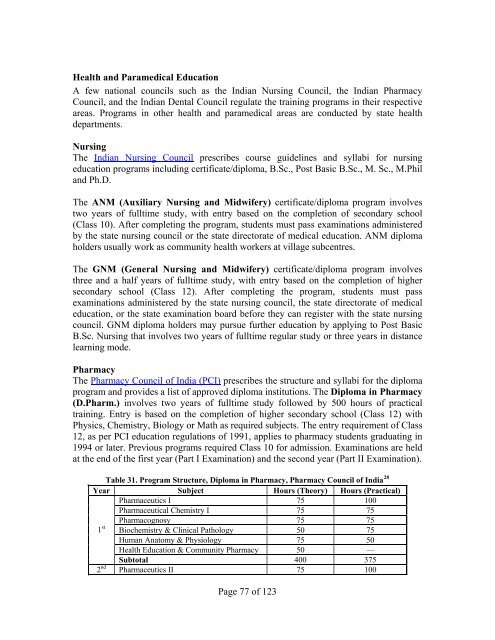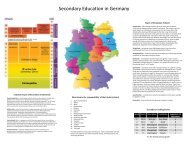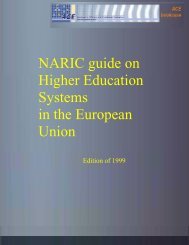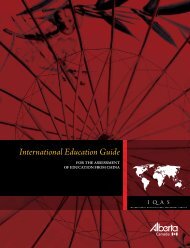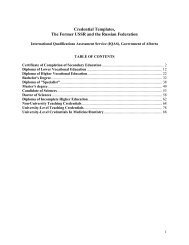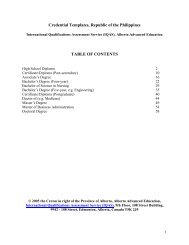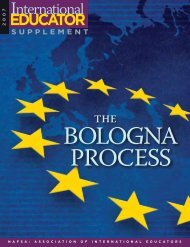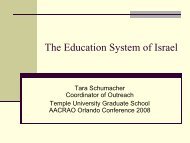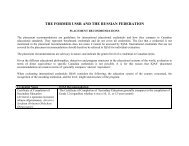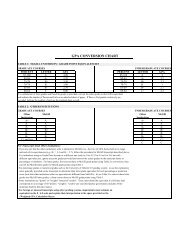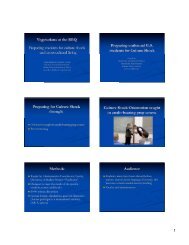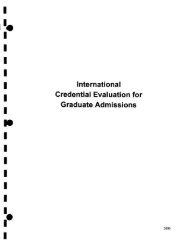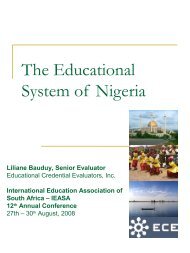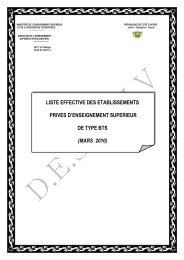International Qualifications Assessment Service (IQAS) - Shelby ...
International Qualifications Assessment Service (IQAS) - Shelby ...
International Qualifications Assessment Service (IQAS) - Shelby ...
You also want an ePaper? Increase the reach of your titles
YUMPU automatically turns print PDFs into web optimized ePapers that Google loves.
Health and Paramedical Education<br />
A few national councils such as the Indian Nursing Council, the Indian Pharmacy<br />
Council, and the Indian Dental Council regulate the training programs in their respective<br />
areas. Programs in other health and paramedical areas are conducted by state health<br />
departments.<br />
Nursing<br />
The Indian Nursing Council prescribes course guidelines and syllabi for nursing<br />
education programs including certificate/diploma, B.Sc., Post Basic B.Sc., M. Sc., M.Phil<br />
and Ph.D.<br />
The ANM (Auxiliary Nursing and Midwifery) certificate/diploma program involves<br />
two years of fulltime study, with entry based on the completion of secondary school<br />
(Class 10). After completing the program, students must pass examinations administered<br />
by the state nursing council or the state directorate of medical education. ANM diploma<br />
holders usually work as community health workers at village subcentres.<br />
The GNM (General Nursing and Midwifery) certificate/diploma program involves<br />
three and a half years of fulltime study, with entry based on the completion of higher<br />
secondary school (Class 12). After completing the program, students must pass<br />
examinations administered by the state nursing council, the state directorate of medical<br />
education, or the state examination board before they can register with the state nursing<br />
council. GNM diploma holders may pursue further education by applying to Post Basic<br />
B.Sc. Nursing that involves two years of fulltime regular study or three years in distance<br />
learning mode.<br />
Pharmacy<br />
The Pharmacy Council of India (PCI) prescribes the structure and syllabi for the diploma<br />
program and provides a list of approved diploma institutions. The Diploma in Pharmacy<br />
(D.Pharm.) involves two years of fulltime study followed by 500 hours of practical<br />
training. Entry is based on the completion of higher secondary school (Class 12) with<br />
Physics, Chemistry, Biology or Math as required subjects. The entry requirement of Class<br />
12, as per PCI education regulations of 1991, applies to pharmacy students graduating in<br />
1994 or later. Previous programs required Class 10 for admission. Examinations are held<br />
at the end of the first year (Part I Examination) and the second year (Part II Examination).<br />
Table 31. Program Structure, Diploma in Pharmacy, Pharmacy Council of India 28<br />
Year Subject Hours (Theory) Hours (Practical)<br />
Pharmaceutics I 75 100<br />
Pharmaceutical Chemistry I 75 75<br />
Pharmacognosy 75 75<br />
1 Biochemistry & Clinical Pathology 50 75<br />
Human Anatomy & Physiology 75 50<br />
Health Education & Community Pharmacy 50 —<br />
st<br />
Subtotal 400 375<br />
2 nd<br />
Pharmaceutics II 75 100<br />
Page 77 of 123


